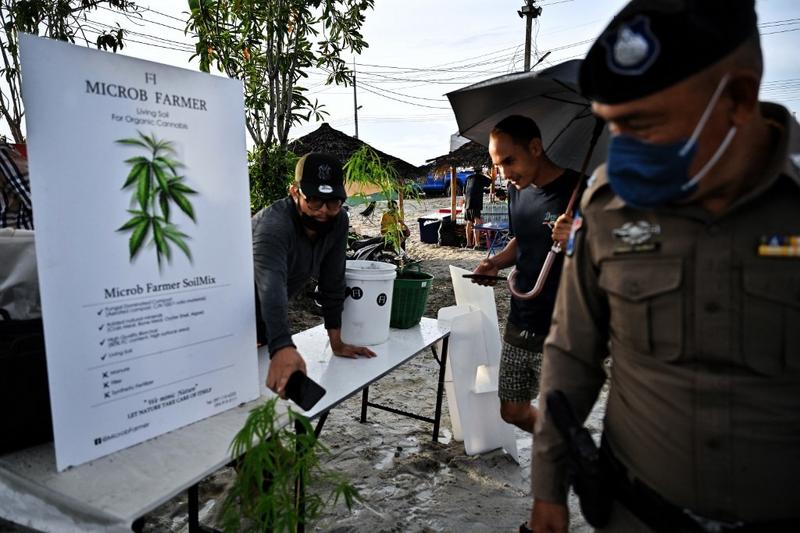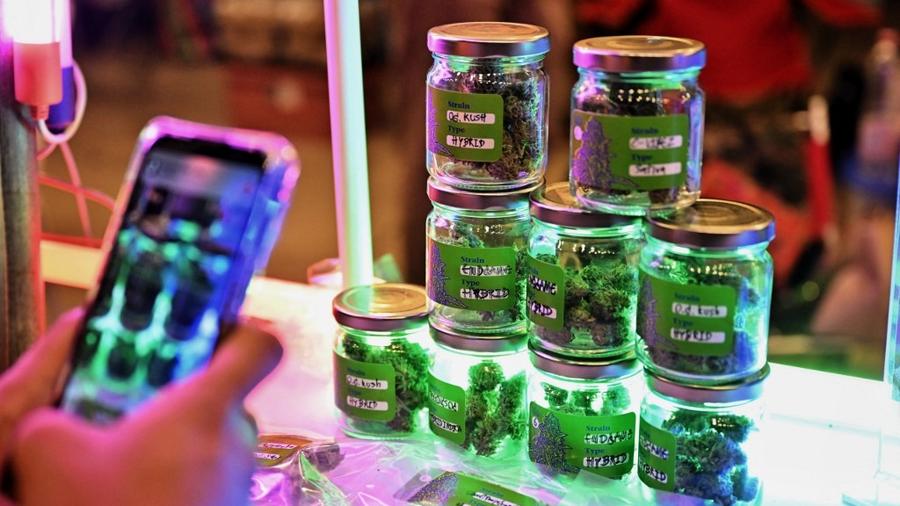
A policeman walks past a stall selling soil mix as people gather to celebrate the legalization of cannabis at the "Thailand: 420 Legalaew!" weekend festival hosted by Highland in Nakhon Pathom province on June 11, 2022. (LILLIAN SUWANRUMPHA / AFP)
The move to become first Asian country to legalize marijuana has sparked widespread concern.
Thailand has been urged to put clearer regulations in place on the use of cannabis following its decision to legalize the growing and consumption of the drug in food and drinks.
In the wake of the country’s June 9 move to become the first in Asia to decriminalize marijuana, experts have criticized the decision as hasty and “immature”.
Thai embassies in various countries, including Indonesia and Japan, reminded Thai people that they should not carry cannabis or related products to those countries or they will face punishment
“The Thai free cannabis policy is very immature,” said Sarana Sommano, an associate professor at Chiang Mai University’s Department of Plant and Soil Sciences. She said the government should have studied the consequences such a move and closed any loopholes before going ahead with the legalization.
“The regulation should be set in place that we only allow medicinal and therapeutic uses in Thailand,” Sarana said.
ALSO READ: Patients seek cheaper supplies as Thailand greenlights cannabis
Thailand’s Department of Health said that food outlets must get permission to sell products containing cannabis, public broadcaster Thai PBS reported on July 10.
The move by Thailand has also triggered warnings from other countries in Asia. Sarana said that the government will have to consider carefully how to respond to the concerns, especially as the Thai economy relies heavily on tourism.
Thai embassies in various countries, including Indonesia and Japan, reminded Thai people that they should not carry cannabis or related products to those countries or they will face punishment.
Countries like China also warned their nationals against the consumption of cannabis in Thailand, saying that they could face legal issues when returning home as the residue can be detected in their body.
The Chinese embassy in Thailand said cannabis remained a strictly controlled substance under the United Nations and most countries still consider the carrying and consumption of the drug as illegal.
ALSO READ: Thailand legalizes growing, consumption of marijuana
Despite constant warnings, on June 28, a Brazilian student was arrested on arrival in Indonesia for carrying cannabis, which he claimed to have bought in Thailand.

Vendors sell strains of cannabis to celebrate the legalization of cannabis at the “Thailand: 420 Legalaew!” weekend festival hosted by Highland in Nakhon Pathom province on June 11, 2022. (LILLIAN SUWANRUMPHA / AFP)
The goal of Thailand’s move to legalize cannabis is to boost the economy and help farmers, but the decision has sparked societal concerns about potential abuse, said Atthachai Homhuan, director of the regulatory affairs department at law firm Tilleke & Gibbins in Thailand. The firm has been assigned to handle the corporate establishment of the Thai Cannabis Industry Association.
Atthachai said that a number of schools in Thailand have banned the consumption of cannabis in any form on their premises.
The law firm director said there are two categories of food which fall under the cannabis legalization provision, fitness food products, or food sold at dining places such as food stalls or cafes.
ALSO READ: Thailand serves up cannabis cuisine to happy customers
He added that the first group of food must be registered with the Thai Food and Drug Administration, and evidence must be presented that the level of cannabidiol, or CBD, and tetrahydrocannabinol, or THC, is in line with the specific regulations. Street food stalls or restaurants should also inform consumers of cannabis-related recipes.
Despite assurances from the Thai health authorities that it is only promoting cannabis for medical use and not recreational purposes, Sarana from Chiang Mai University said she has not seen the control acts or any updated regulations.
“I guess it is in the grey zone now,” she said, noting the government should prohibit the use of the drug rather than promote and encourage its use if the law is still not in place. “This is going to create problems and cause a lot of hurt a lot to the country,” she said.
For example, “when they said (it is) allowed to use (cannabis) as to treat themselves for medicinal purposes, what is the criteria for that?” she asked.
Noting some doctors have raised concerns over the side effects of the psychotropic substances including that cannabis that could cause social and mental health problems, Atthachai said the Thai government is listening to voices from different sectors and is reviewing a draft bill for the use of cannabis and hemp.
READ MORE: Thailand says it's seeking to freely allow medical marijuana
“In this draft bill, there will be regulated schemes or procedures (about) how the license or the approval system will be made,” said Atthachai, noting the major focus will be on medical treatment.
Sarana said she is worried that the adoption of cannabis in the agricultural sector may in turn harm the industry and Thailand’s exports as other countries may be concerned about the issues like using cannabis biomass to feed chicken.


